 EDITOR'S PICK
EDITOR'S PICK
An EV Road User Charge Is Looming. Could It Slam The Brakes On Australia's Clean Car Transition?
25 Aug 2025 | Synopsis
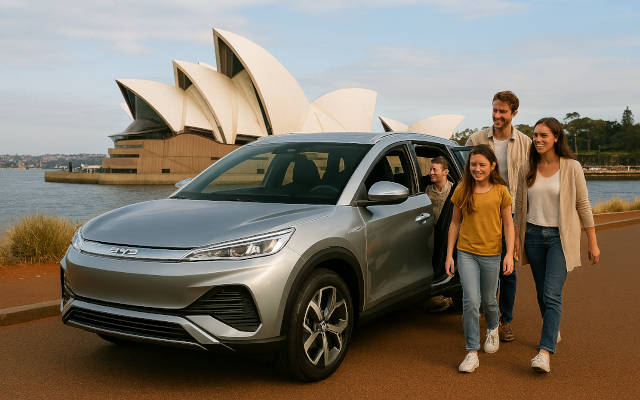 As Australia's electric vehicle fleet grows, the government is considering a road user charge to replace dwindling fuel excise revenue. A proposal from New South Wales suggests a fee of 2.97 cents per kilometre for battery EVs, with collection potentially based on distance driven. Critics worry this will hinder the clean transport transition, arguing the charge should apply to all vehicles, not just EVs.
As Australia's electric vehicle fleet grows, the government is considering a road user charge to replace dwindling fuel excise revenue. A proposal from New South Wales suggests a fee of 2.97 cents per kilometre for battery EVs, with collection potentially based on distance driven. Critics worry this will hinder the clean transport transition, arguing the charge should apply to all vehicles, not just EVs. Rivian R4 And R5 Will Be Lower-Cost 'Siblings' Than R2 And R3, CEO Says
25 Aug 2025 | Synopsis
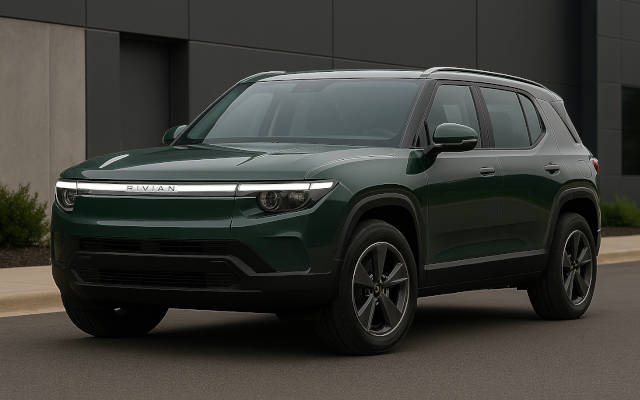 Rivian CEO RJ Scaringe reveals R4 & R5 EVs in early concept stage as "sibling set" sharing new platform, priced lower than upcoming R2/R3 models ($45K starting). While Tesla's Musk calls cheap EVs "pointless" without autonomy, Rivian pursues full-line automaker strategy with mainstream affordable EVs. No engineering teams assigned yet - purely conceptual stage.
Rivian CEO RJ Scaringe reveals R4 & R5 EVs in early concept stage as "sibling set" sharing new platform, priced lower than upcoming R2/R3 models ($45K starting). While Tesla's Musk calls cheap EVs "pointless" without autonomy, Rivian pursues full-line automaker strategy with mainstream affordable EVs. No engineering teams assigned yet - purely conceptual stage.Charted: Global EV Adoption (2019 vs. 2025)
24 Aug 2025 | Synopsis
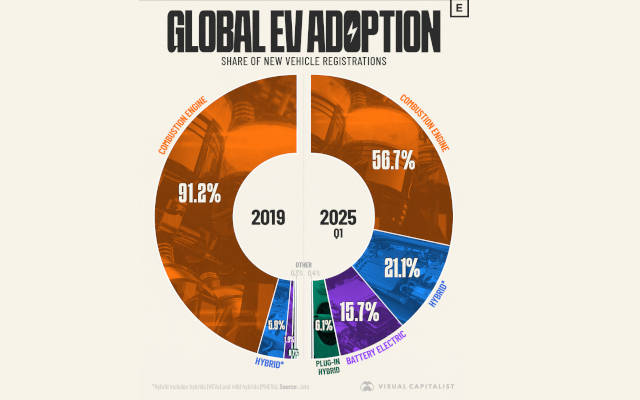 Global sales of electrified vehicles (EVs) soared from just 9% of the market in 2019 to 43% in the first quarter of 2025. This dramatic increase is largely propelled by China, which accounts for 57% of global battery-electric vehicle registrations. Consequently, the market share of traditional combustion engine vehicles has fallen from 91.2% to 56.7% in the same period, highlighting a rapid shift in consumer preference toward electric and hybrid options.
Global sales of electrified vehicles (EVs) soared from just 9% of the market in 2019 to 43% in the first quarter of 2025. This dramatic increase is largely propelled by China, which accounts for 57% of global battery-electric vehicle registrations. Consequently, the market share of traditional combustion engine vehicles has fallen from 91.2% to 56.7% in the same period, highlighting a rapid shift in consumer preference toward electric and hybrid options.Electric Vehicle Taxes by State, 2025
24 Aug 2025 | Synopsis
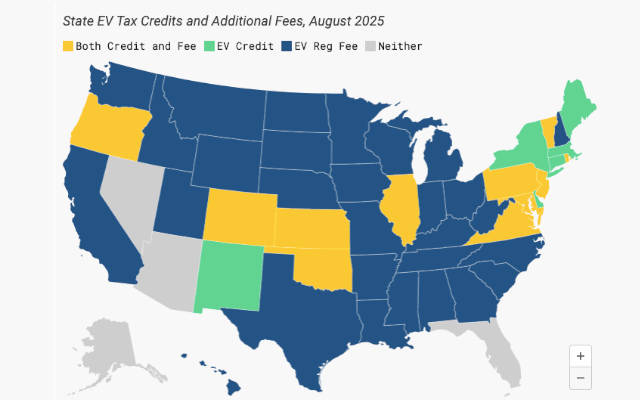 As EV adoption grows, states face declining gas tax revenue and are responding with varied policies. Forty states now impose higher annual registration fees on EVs - ranging from $50 to $260 - to offset lost fuel taxes. Seventeen states offer purchase incentives, while some also tax EV charging. A few states have launched per-mile VMT programs to better link road use to funding. The landscape reflects tension between promoting EVs and maintaining infrastructure budgets
As EV adoption grows, states face declining gas tax revenue and are responding with varied policies. Forty states now impose higher annual registration fees on EVs - ranging from $50 to $260 - to offset lost fuel taxes. Seventeen states offer purchase incentives, while some also tax EV charging. A few states have launched per-mile VMT programs to better link road use to funding. The landscape reflects tension between promoting EVs and maintaining infrastructure budgetsHow to Use Your EV as a Home Backup Power Source
23 Aug 2025 | Synopsis
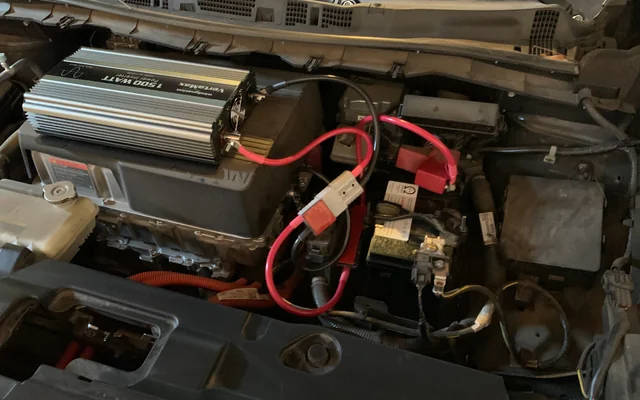 EVs can serve as emergency power sources during outages. While the 12V auxiliary battery offers limited backup for small devices, bidirectional EVs (like the F-150 Lightning or Kia EV9) can power homes for hours or days. Non-bidirectional models require complex retrofits. Home batteries remain the most reliable option. Choosing the right setup depends on your energy needs and vehicle capabilities.
EVs can serve as emergency power sources during outages. While the 12V auxiliary battery offers limited backup for small devices, bidirectional EVs (like the F-150 Lightning or Kia EV9) can power homes for hours or days. Non-bidirectional models require complex retrofits. Home batteries remain the most reliable option. Choosing the right setup depends on your energy needs and vehicle capabilities.
 Si Exclusive
Si Exclusive
Hydrogen's Flight Path: Fuel Cells, Turbines, and the Economics of Clean Aviation
10 Oct 2025 |  Aviation is shifting from Jet A to four fuel systems: electricity, hydrogen (fuel cell and combustion), SAF, and petroleum. Fuel cells suit short-haul aircraft; hydrogen combustion may power long-range jets. SAF bridges legacy fleets. Hydrogen costs - $5-$7/kg today, possibly $2/kg by 2040 - impact ticket prices and infrastructure decisions. Airport authorities, airlines, and governments will share deployment costs. Each fuel has distinct environmental pros and cons shaping aviation's net-zero future.
Aviation is shifting from Jet A to four fuel systems: electricity, hydrogen (fuel cell and combustion), SAF, and petroleum. Fuel cells suit short-haul aircraft; hydrogen combustion may power long-range jets. SAF bridges legacy fleets. Hydrogen costs - $5-$7/kg today, possibly $2/kg by 2040 - impact ticket prices and infrastructure decisions. Airport authorities, airlines, and governments will share deployment costs. Each fuel has distinct environmental pros and cons shaping aviation's net-zero future.
 11 Oct 2025 06:50:20 UTC |
RECENT PODCASTS
BYD Soars - Cheaper Tesla Models - The Bolt is Back - Rivian
SEARCH RSSTREAM
 48 New Postings In Past 24 Hours
48 New Postings In Past 24 Hours
Category:mobility
Region:Europe
Date:10 Oct 2025
Category:energy
Region:Global
Date:10 Oct 2025
Category:mobility
Region:SoAmerica
Date:10 Oct 2025
Category:energy
Region:NoAmerica
Date:10 Oct 2025
Category:mobility
Region:NoAmerica
Date:10 Oct 2025
Category:finance
Region:AsiaPacific
Date:10 Oct 2025
Category:policy
Region:NoAmerica
Date:10 Oct 2025
Category:finance
Region:NoAmerica
Date:10 Oct 2025
Category:mobility
Region:AsiaPacific
Date:10 Oct 2025
Category:policy
Region:NoAmerica
Date:10 Oct 2025